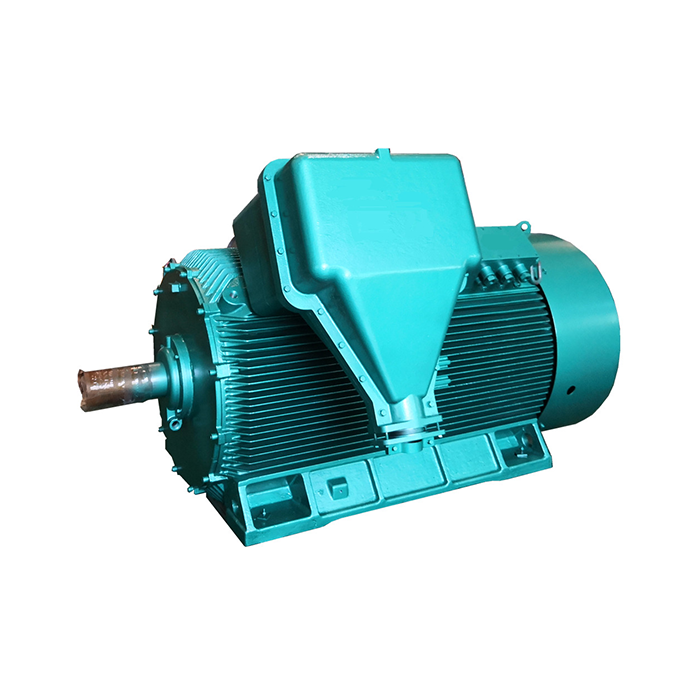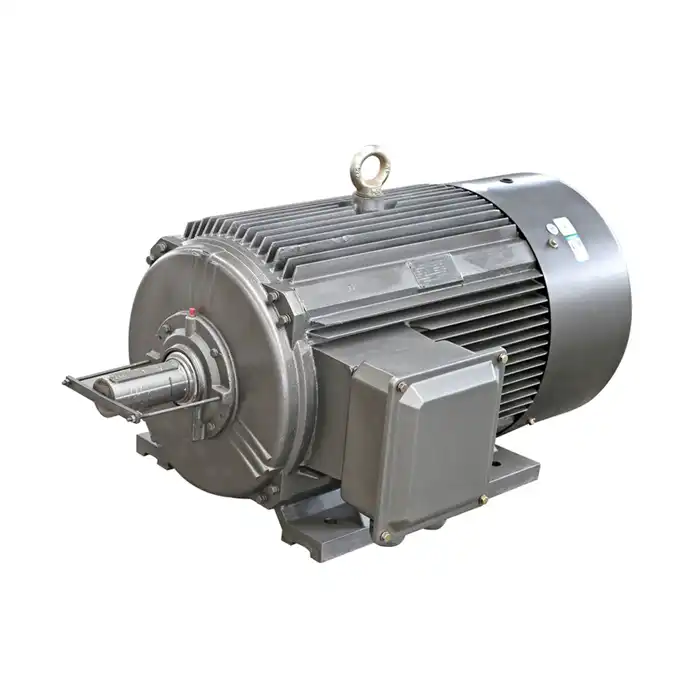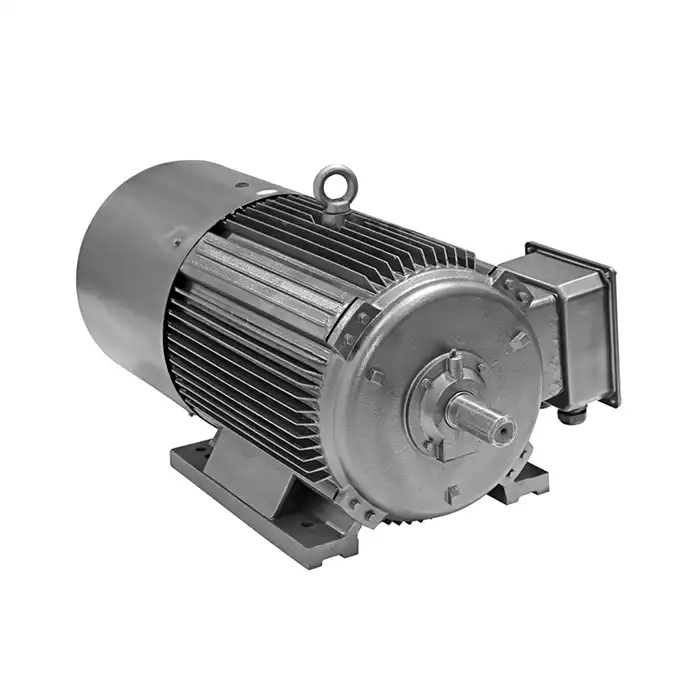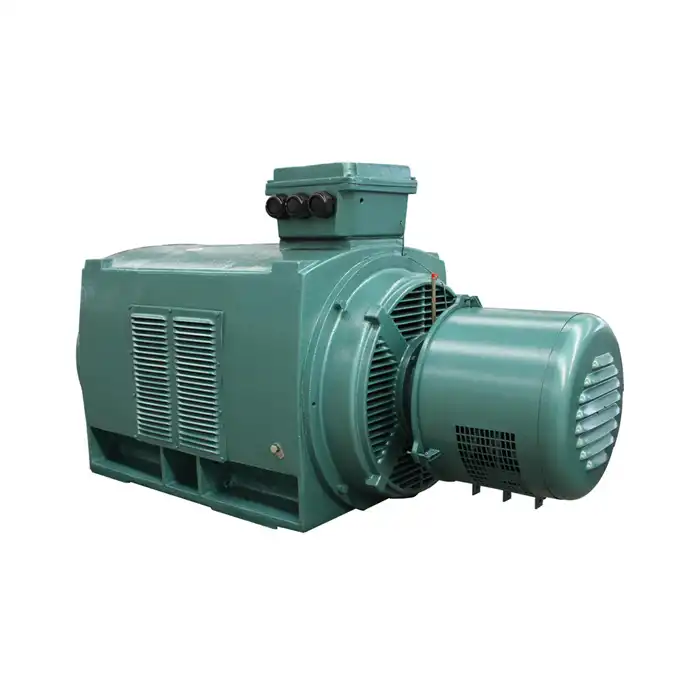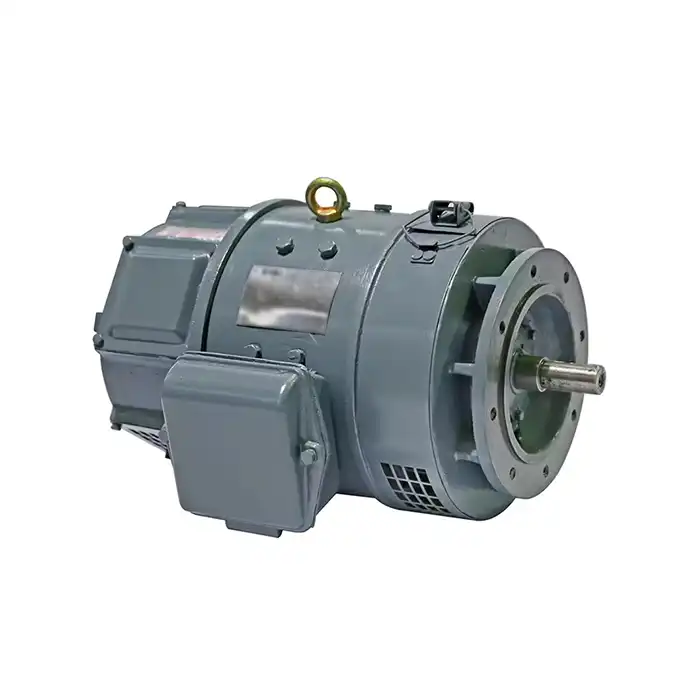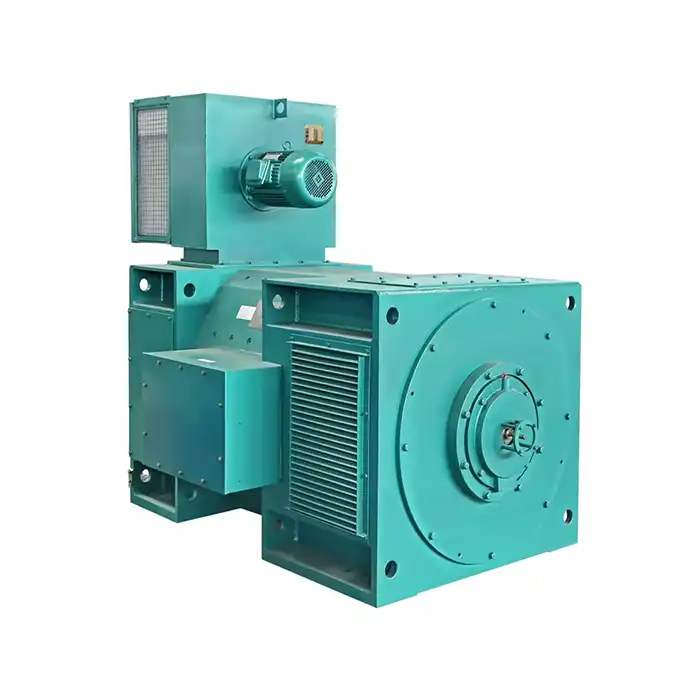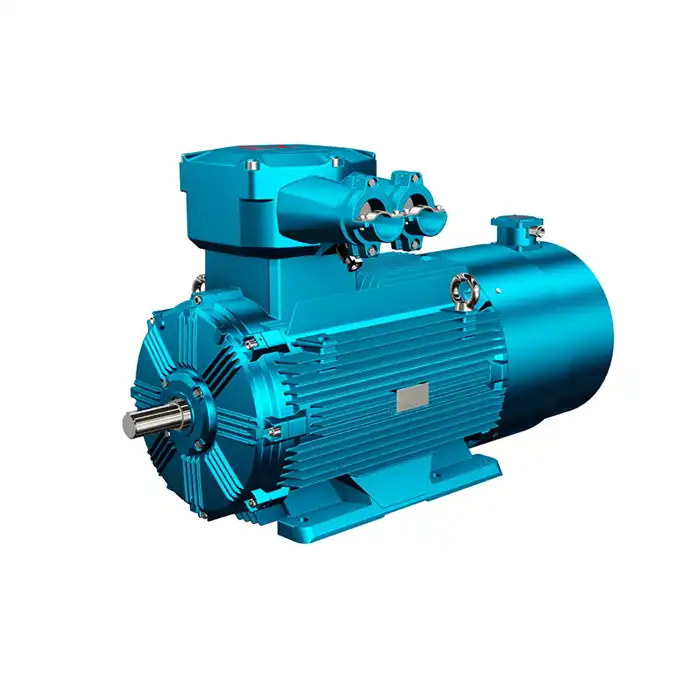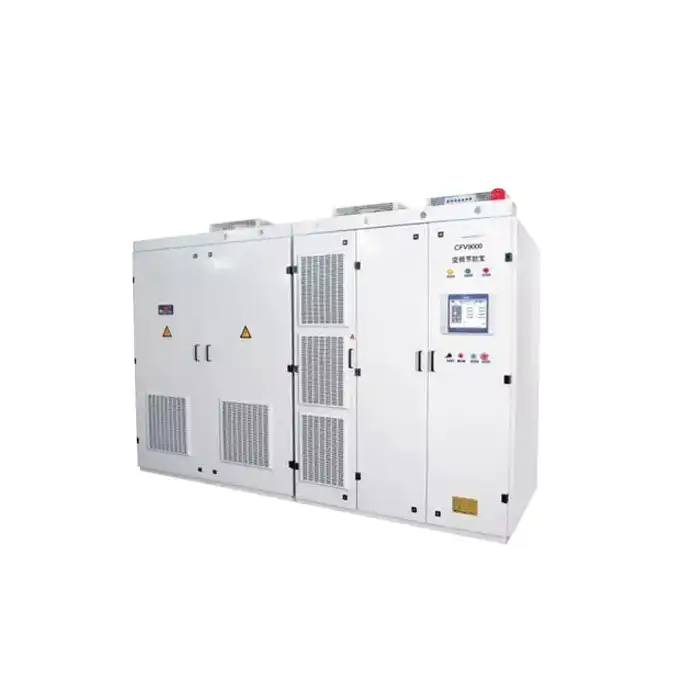A VFD duty motor delivers substantial benefits for variable speed operations by providing enhanced insulation systems, improved cooling mechanisms, and superior harmonic tolerance that standard motors cannot match. These specialized motors work seamlessly with variable frequency drives to optimize energy consumption, reduce mechanical stress, and deliver precise speed control across diverse industrial applications. The enhanced design features of a vfd duty motor enable smooth operation at varying frequencies while maintaining consistent torque output and extending equipment lifespan significantly.
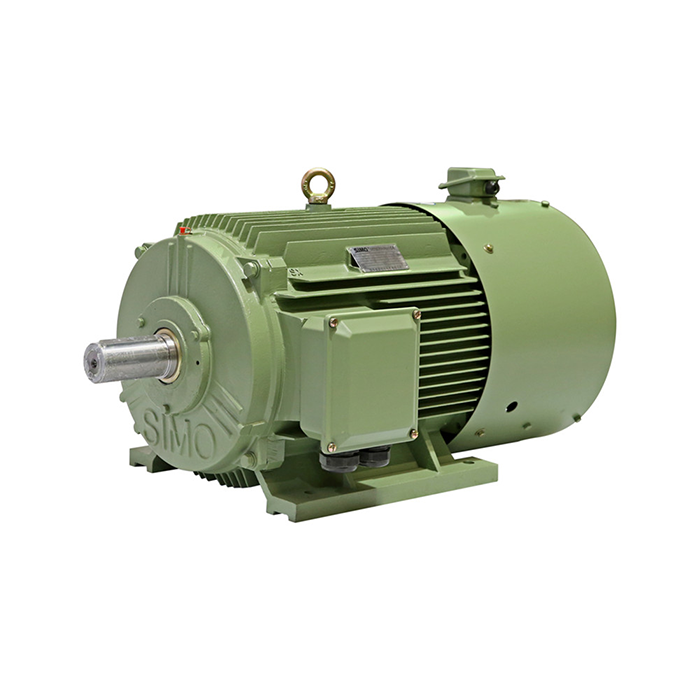
Series:YVFE5
Frequency conversion range:30hz~50hz,5hz~70hz,5hz~100hz
Power range:0.75-1000kW
Protection level:IP55
Application:are suitable for driving various mechanical equipment that require continuous and frequent forward and reverse rotation, such as steel rolling, lifting, transportation, machine tools, printing and dyeing, papermaking, chemicals, textiles, pharmaceuticals, etc., and can be used with various domestic and foreign variable frequency power supplies.
Advantage:high efficiency, wide speed range, high precision, stable operation, and easy operation and maintenance.
Certificate:installation dimensions comply with International Electrotechnical Commission (IEC) standards.
Others: SKF, NSK, FAG bearings can be replaced according to customer requirements.
Understanding VFD Duty Motor Design and Key Parameters
Variable frequency drive motors incorporate specific design elements that differentiate them from conventional AC motors.
Enhanced Insulation System
One of the most significant design differences between variable frequency drive (VFD) motors and conventional AC motors is the enhanced insulation system. VFD motors are typically equipped with Class F or Class H insulation, which is rated for continuous operation at elevated temperatures. This advanced insulation is essential for withstanding the voltage stresses generated by inverter duty applications, where rapid voltage fluctuations are common. These stressors can degrade standard insulation systems, but the robust design of VFD motor insulation ensures durability and long-term reliability, even under demanding operating conditions.
Specialized Motor Cooling Systems
In VFD applications, cooling systems require careful consideration due to the varying speeds at which the motor operates. The cooling fan's effectiveness can change with the motor’s speed, so many manufacturers incorporate independent cooling fans or enhanced ventilation designs to maintain optimal operating temperatures. These systems ensure that the motor remains within safe thermal limits throughout the entire speed range. Proper cooling is essential for maintaining motor efficiency and preventing overheating, especially during extended periods of high-speed operation, which is common in industrial applications.
Magnetic Core and Rotor Design
VFD duty motors are designed with premium materials to minimize losses and enhance performance. The motor’s magnetic core is constructed using high-quality steel laminations, which help to reduce core losses and decrease the effects of harmonic distortion. This is critical for maintaining energy efficiency, as harmonic distortion can lead to unwanted energy consumption and reduced motor lifespan. Additionally, VFD motors often feature enhanced rotor construction, which allows for smoother operation across a wider range of speeds, further improving the overall performance of the motor.
Key Technical Parameters for VFD Motors
Several technical parameters distinguish VFD motors from conventional AC motors. These include their ability to handle rapid voltage rise times and high voltage spikes, critical in environments with frequent switching. VFD motors are designed to tolerate voltage rise times as short as 0.1 microseconds and can withstand voltage spikes up to 1600 volts without degradation. This is essential for ensuring motor longevity and performance when used in applications involving frequent switching or power surges.
Core Benefits of VFD Motor Integration
Energy Efficiency and Cost Savings
The primary advantage of implementing Variable Frequency Drive (VFD) motor systems in industrial applications is energy efficiency. VFDs can reduce energy consumption by 20-50% compared to traditional motor control methods such as throttling valves or mechanical speed control. This is largely due to the ability of VFDs to precisely match the motor speed to the load requirements. In conventional systems, energy is often wasted through excess speed or inefficient control methods. By adjusting the motor speed to meet the actual demand, VFD systems minimize unnecessary energy dissipation, leading to significant cost savings and more sustainable operations.
Reduced Mechanical Stress and Extended Equipment Life
VFD duty motor systems also help reduce mechanical stress, which contributes to a longer lifespan for industrial equipment. The soft start capabilities of VFDs eliminate the harsh mechanical shock that occurs with across-the-line starting methods. This smooth ramp-up of motor speed prevents damage to belts, gears, and other mechanical components. Over time, this gentler operation translates into fewer breakdowns, reduced maintenance needs, and a significantly extended lifespan for the entire system. As a result, companies experience lower maintenance costs and enhanced system reliability.
Improved Process Control and Precision
Integrating VFD systems into process control operations provides significant improvements in precision and flexibility. Manufacturing processes that require exact speed control, such as conveyor belts or pumps, benefit from the ability to adjust motor speed dynamically. This ensures consistent production rates regardless of variations in load. Moreover, VFDs enable torque control, allowing for precise material handling and processing. Whether it's controlling the speed of a pump in a water treatment plant or adjusting the speed of a conveyor in a packaging line, VFDs ensure that the process operates smoothly and efficiently, even under fluctuating conditions.
Motor Protection and System Reliability
Modern VFD motor systems are equipped with advanced protection features that help safeguard both the motor and the broader system. Overcurrent protection ensures that the motor is not subjected to excessive current, preventing overheating or damage. Thermal monitoring continuously checks the motor's temperature, while phase loss detection ensures that the motor operates under balanced electrical conditions. These integrated protective functions help prevent costly motor failures and unplanned downtime, which can be especially critical in industries where continuous operation is necessary. By incorporating these safety features, VFD systems offer greater reliability and reduce the likelihood of disruptions in critical industrial processes.
XCMOTOR VFD Duty Motors: Superior Performance Standards
XCMOTOR's inverter duty motors incorporate advanced design features that surpass industry standards. Our motors feature premium insulation systems rated for continuous operation with switching frequencies up to 20 kHz. The enhanced bearing systems include electrical discharge protection and extended lubrication intervals.
The cooling system design ensures consistent performance across the full speed range. Independent cooling fans maintain optimal temperatures even during low-speed operation when standard fan-cooled motors struggle with heat dissipation. This design approach extends motor life and maintains consistent performance.
Quality control processes at XCMOTOR ensure every motor meets strict performance criteria. Each unit undergoes comprehensive testing including insulation resistance, vibration analysis, and thermal cycling to verify long-term reliability. Our original products policy guarantees authentic components from trusted suppliers.
Technical support distinguishes XCMOTOR from competitors. Our dedicated support team operates seven days per week, providing assistance with motor selection, installation guidance, and troubleshooting support. This comprehensive support structure minimizes downtime and ensures optimal system performance.
Optimizing VFD Motor Performance in Industrial Applications
Proper motor selection requires careful consideration of load characteristics and operating conditions. Variable torque loads like fans and pumps benefit from motors designed specifically for these applications. Constant torque applications such as conveyors require different motor characteristics and drive programming.
Installation practices significantly impact system performance. Proper cable routing minimizes electromagnetic interference, while correct grounding techniques prevent bearing currents that can damage motors over time. Cable length considerations affect voltage reflection and require appropriate drive programming adjustments.
Drive programming optimization maximizes system benefits. Acceleration and deceleration ramp settings should match mechanical system requirements to prevent excessive stress while maintaining productivity. Carrier frequency adjustments balance motor performance with drive efficiency and acoustic considerations.
Regular maintenance schedules ensure continued optimal performance. Thermal imaging identifies potential issues before failures occur, while vibration monitoring detects mechanical problems early. Proper lubrication intervals and insulation testing prevent unexpected failures and extend equipment life.
Industry-Specific Applications and Load Matching
Manufacturing environments benefit tremendously from VFD duty motor integration across diverse applications. Automotive assembly lines utilize precise speed control for conveyor systems and robotic applications. Electronics manufacturing requires clean power and minimal electromagnetic interference for sensitive production processes.
HVAC applications represent significant energy savings opportunities. Commercial building ventilation systems can reduce energy consumption by 40% or more through variable speed fan control. Pump applications in water treatment facilities achieve similar savings while improving process control precision.
Power generation facilities utilize VFD motors for auxiliary equipment including cooling water pumps, fuel handling systems, and emission control equipment. The precise control capabilities improve plant efficiency while reducing maintenance requirements on critical systems.
Process control applications in chemical and food processing industries benefit from the precise speed regulation and torque control capabilities. These applications often require explosion-proof motor designs and specialized coatings to withstand harsh environmental conditions.
Conclusion
VFD duty motors provide essential benefits for modern industrial variable speed operations through enhanced design features and superior performance capabilities. The energy savings, improved process control, and extended equipment life justify the investment across diverse applications. XCMOTOR's commitment to quality products and comprehensive support ensures successful implementation and long-term reliability. Proper selection, installation, and maintenance practices maximize these benefits while minimizing operational costs. The future of industrial motor control relies on the proven advantages that VFD motor systems deliver.
Frequently Asked Questions
Q1: What makes a VFD duty motor different from a standard motor?
A: VFD duty motors feature enhanced insulation systems, improved cooling designs, and specialized bearings to handle the electrical stress from variable frequency drives. These motors withstand voltage spikes and harmonics that would damage standard motors over time.
Q2: Can I use a standard motor with a variable frequency drive?
A: While possible for short periods, standard motors lack the insulation and cooling capabilities for reliable long-term VFD operation. Using standard motors with drives typically results in premature insulation failure and reduced motor life.
Q3: How much energy can VFD motor systems save compared to traditional control methods?
A: Energy savings typically range from 20-50% depending on the application and load characteristics. Variable torque loads like fans and pumps generally achieve higher savings percentages than constant torque applications.
Choose XCMOTOR for Reliable VFD Motor Solutions
XCMOTOR stands as your trusted vfd duty motor supplier, delivering superior power equipment solutions that exceed industry standards. Our comprehensive product line serves manufacturing, HVAC, energy, and automation applications with proven reliability and performance. The original products guarantee ensures authentic components while our fast delivery service minimizes project delays.
Our technical expertise extends beyond product supply to include application engineering and ongoing support. The 30-day return policy demonstrates confidence in product quality, while dedicated weekend support ensures assistance when you need it most. Whether upgrading existing systems or designing new installations, XCMOTOR provides the expertise and products for successful project completion.
Partner with XCMOTOR to optimize your variable speed operations and achieve maximum energy savings. Our experienced team helps select the right motor for your specific application requirements while providing comprehensive technical support throughout the project lifecycle. Contact us at xcmotors@163.com to discuss your VFD duty motor requirements and discover how our solutions can improve your operational efficiency.
References
- Institute of Electrical and Electronics Engineers. "IEEE Standard 841: Standard for Petroleum and Chemical Industry - Premium Efficiency Severe Duty Totally Enclosed Fan-Cooled (TEFC) Squirrel Cage Induction Motors." IEEE Standards Association, 2021.
- National Electrical Manufacturers Association. "NEMA MG 1-2016: Motors and Generators Standard - Part 31: Definite Purpose Inverter-Fed Polyphase Motors." NEMA Publications, 2016.
- Bonnett, Austin H. "Root Cause AC Motor Failure Analysis with a Focus on Shaft Failures." IEEE Transactions on Industry Applications, Vol. 36, No. 5, 2000.
- Electric Power Research Institute. "Variable Frequency Drive Application Guidelines for HVAC Systems." EPRI Technical Report, 2019.
- Motor and Drive Engineering Handbook. "Inverter Duty Motor Design Considerations for Variable Frequency Drive Applications." Technical Publishing International, 2018.
- American Society of Heating, Refrigerating and Air-Conditioning Engineers. "ASHRAE Handbook - HVAC Systems and Equipment: Variable Speed Drives." ASHRAE Publications, 2020.



